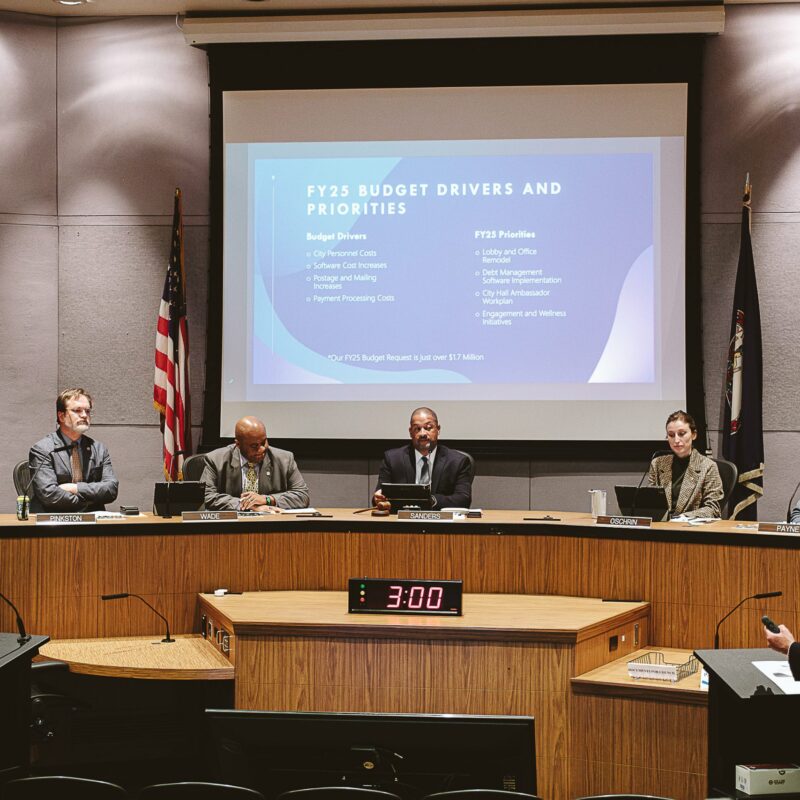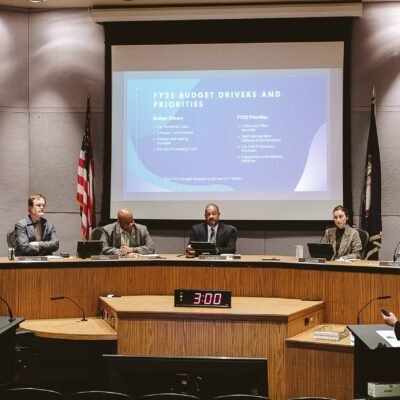
The last time C-VILLE sat down with John Grisham, one year ago, he was on the cusp of starting a new book. After penning 18 novels (basically cornering the market on legal thrillers over the last decade), Grisham was tackling a nonfiction project. At that time, he expressed some concern over the matters of accuracy and detail that such a book demands. It was not as if he could make the narrative bend to his will should he hit a rough patch in the writing or storytelling, and he wasn’t sure he’d enjoy those precise labors.
Grisham needn’t have worried. The tedium of fact-checking might have made the writing more slow-going than he was used to, but Grisham has a keen sense of story (as millions of loyal readers will attest) and in the unhappy tale of Ron Williamson he found all the elements that make a Grisham book the compulsively readable beast that it is. Williamson, once a hot prospect in professional baseball, burned out about as quickly as his star had risen. Born in small-town Oklahoma, where Mickey Mantle was (and remains) a hero, Williamson was haunted—by the echoes of what could have been on the field, by guilt over his spoiled childhood ways, and quite literally by the voices that burdened him from his untreated bi-polar disorder, paranoia and schizophrenia. Once a hero himself, Williamson became a drunk, a has-been, a troublemaker and a nuisance. When a grisly rape and murder occurred in his hometown—and subsequently remained unsolved—police eventually pinned the crime, unjustly, on him.
A chain of bad police work and corruption, compounded by bad legal work, landed Williamson on death row for a crime he didn’t commit. After 12 years in prison he was exonerated (again, in a Grisham-esque last-minute move), but Williamson was too far gone to enjoy his new freedom. He died a sick and weary man in 2004, at the age of 51.
Last month Grisham talked to a few hundred UVA law students about Williamson, revealing the link he felt to the man when he got to know his story—a story he said he’s “still losing sleep over.”
“I grew up in a small town in Arkansas,” Grisham said. “I dreamed of playing major league baseball. He did too, but he had the talent.”
Grisham also called out the sorry state of America’s death penalty system.
After his talk with the students, he talked to C-VILLE again. Here’s what he had to say.—Cathy Harding
Cathy Harding: How has writing The Innocent Man, a work of nonfiction, changed you as a writer?
John Grisham: To answer that question we’re going to have to wait and see what happens next, what the next book is and whether or not I have the appetite to go back and do nonfiction again. It’s a fascinating process. It’s very challenging because of the research required and the accuracy that’s demanded, but fiction’s a lot more fun because you don’t have to worry about all the research. So I can’t answer that question, I don’t think. This book reads like a novel, a legal thriller—I mean, the pages fly by. It’s just kind of the way I do it. I doubt if I’d change a whole lot.
Did it change your writing habits at all, the routines associated with writing?
Yeah, yeah. It took a year to write it, and the whole time I was writing I was doing research. I would actually go research something—a section of a part of the trial or whatever—and then go back the next day and write it while it was fresh. It was a very different process. And a good day was three or four pages, whereas with a novel a good day is 10 pages. It was a lot slower, a lot more tedious.
Do you have a special place where you sit down and do that work?
Only one place.
And so all that remained the same?
All that remained the same. Now, I was at the office more, Downtown, where all the research was, because I had so many phone calls to make. I would go in almost every day to the office, which I don’t normally do, to call Oklahoma, to call witnesses and people like that.
Has this book been optioned yet?
No. It’s been looked at by a few people out there, but nothing really exciting has happened yet. I mean, really, over the years we’ve learned it’s best to just publish the book and let everybody read it, without being in a hurry, and then take our time and see who wants to talk about movies.
When you talked about the death penalty system to these law students today, you said, “Even if you support it, you have to realize it’s broken.” But no one asked you how to fix it, so I’ll ask.
Well, I’ll tell you, there are some really good ways. First of all, it’d be far cheaper for every state to have a team of death penalty prosecutors and a team of death penalty defense lawyers who go around and try these cases. Lawyers who do nothing but that kind of work. It would be far cheaper to have a statewide commission to screen the death penalty cases, and take the options away from local prosecutors. Because politics get involved, publicity gets involved, all this stuff gets involved. So those are two things you can do right there.
I say it would save money because you wouldn’t have—this case cost taxpayers several million bucks; incarceration costs 50,000 bucks a year, this guy was in for 12 years—that math is easy. Then you throw in the cost of the civil lawsuits, settlements—it’s millions of dollars just wasted, not to mention a guy’s life. So it’s real taxpayers’ savings to set up a commission, to screen the cases. And then the ones where they say, “O.K., we’re going to certify this as a death penalty case,” have the best lawyers on both sides of the courtroom, and a good judge, and try it fairly.
Do you think that these extraneous factors that you’re describing—politics and so forth—are more pronounced in small-town settings? I mean, you’re certainly making the case that the small-townness of it affected Ron Williamson. Some of your fiction would suggest that, too.
Probably so, I would think. Although we can easily imagine a horrible crime in a big city where, with all this pressure behind it, the prosecutor feels compelled to bring a death penalty case. But I do think it’s more of a small-town thing, where juries are not quite as sophisticated, cops and then prosecutors are not quite as sophisticated—we have more problems.
There was no apology, no compensation in Williamson’s case. Locally, we have the case of Earl Washington—you might be familiar with that—a retarded guy who was falsely imprisoned and he’s suing for some compensation. How should the justice system handle it when these mistakes are revealed?
Well, first of all, it’d be nice to have an apology from somebody. It rarely happens. And some states have set up compensation boards—Massachusetts was the first, I think New York’s got one—but only two or three. The niece of the victim in this story is crusading in Oklahoma to get a compensation bill
passed for these guys who are locked up wrongly—wrongfully convicted. You know, it’s not a great deal of money, but they’ve got to be compensated. How much a year for living on death row? It’s got to be worth something. They have no support when they get out, they get no counseling, no nothing. There’s no support staff for these people. They’re just tossed out and almost all become disasters. Within five years they don’t survive. It’s really awful.
How do these exonerations end up affecting either the victims or the families of victims of the crimes?
Well, it affects them adversely, because for 10 years they’ve known that a real murderer was in prison. O.K., come to find out, no, he’s not. He’s running free, or killing someone else, which has happened many times. It’s horrible for victims. And the one thing that this case illuminates is the fact that it could easily have been avoided. Thankfully now, with so much DNA—cops are using DNA to screen cases, and to make sure they’re going after the right guys, and to get the right convictions. So there is more, there’s better evidence and better proof now. But there are still wrongful convictions happening every month, for all the reasons I gave you—bad lawyers, bad cops, bad prosecutors, whatever.
Writing this book and working on this research—does this end up becoming almost a cause that you’re living with?
I wouldn’t use the word “cause” because, truthfully, by the time October is over and I’ve published the book and I’ve done the PR and I’ve gone around, I’ll be thinking about the next book. I rarely go back and revisit something. And I’ve touched on several issues over the years, in some of the books, and I find it easy to drop it and move on. I did agree to be on the board of directors for the Innocence Project in New York, so I’m sure I’ll spend a few years working with those people, and I look forward to it.
You obviously admire their work. You talked about Barry Scheck, who runs the Innocence Project, a couple of times in the course of this. Is there a particular quality that you find in the people who are doing this work?
They’re the luckiest people I know right now, because what they’re doing is so good, it’s so right, it can’t be questioned by anybody. And look at the results: You’re getting these guys out of jail after 20 years, the money’s pouring in, and they’re getting publicity and everything feels good about it. And good for them. You know that’s one reason I’m anxious to work with them. They are so committed. Barry Scheck’s group has exonerated 181 people as of last week. It’s amazing the work they’ve done.
One of the themes that comes up in The Innocent Man is the question of competency, mental illness. Do you think the legal system is really equipped to deal with something as complicated as the mental health of an individual, particularly when they’re as far gone as somebody like Williamson?
I believe that, on the issue of mental competency, it is such a glaring issue for a defense lawyer, it’s usually hashed about and examined fairly carefully. I feel better about that one issue in the criminal process and procedure. I do think most of those cases do get looked at because it’s, again, it’s so obvious. Most of these criminal cases, the people are guilty, O.K.? You don’t have much of a defense, so you’re desperate for something. If you can find someone who’s borderline retarded, someone who’s bi-polar or depressed—or drug addicted—you grab it as a lawyer. And so that issue normally gets played out.
You used a phrase about Ron Williamson: “He was truthful, but in a way that scared people.”
It’s very simple: He was sitting in the courtroom and people started telling lies, and no one was stopping them, and he erupted—and he knew he was telling the truth. I think some of the other people in the courtroom sensed that he was telling the truth, because he was acting so crazy. But by then he was so messed up mentally, and unmedicated, they didn’t know what to think. He just scared people. He was a big, strong, rowdy guy. He frightened people.
You describe yourself as a “loyal Democrat.” How would you handicap the mid-term elections, if you were a betting man?
Some gains by the Democrats. I’m not sure the Democrats want to regain the House this year, because then they’ve got two years to govern, which will be impossible. The goal is to regain power in two years—in ’08, not ’06. I’d like to pick up three or four seats in the Senate, make things real close in the House, and I think that’s doable. It depends on how bad the war gets in the next six weeks—and also the economy. Those are the two issues we always go back to.
In the meantime, in the next six weeks, are you going to be on a book tour, talking, going around the country?
Not really a tour—a fair amount of PR, and I go to a few bookstores down South that I always go to. I don’t do a lot of PR—I mean, you know me, I’m kind of hard to catch.
You’ve suggested that you don’t know what the next project is yet. Is that really true?
Yeah, but it’ll be a novel. I’ve got a couple of ideas, and I won’t start until January, February, something like that.
Going to go to Italy between now and then, something like that?
Probably, yeah, if I can get away.





